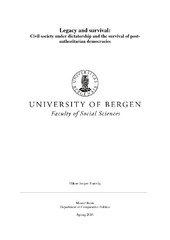Legacy and survival: Civil society under dictatorship and the survival of post-authoritarian democracies
Master thesis
Permanent lenke
https://hdl.handle.net/1956/12295Utgivelsesdato
2016-06-01Metadata
Vis full innførselSamlinger
Sammendrag
Why do some democracies fail while others survive? Much research has shown that a vibrant and strong civil society is important for democratic performance and survival. At the same time, the legacy of certain traits and features of the past authoritarian regime can exert a significant effect on the survival of the emerging democracy. Yet, little or no literature has sought to combine the aspects of legacy and civil society in the way it is done here. Rather than focusing on its manifestation in democracies, I investigate how previous activation of civil society - defined as key forms of collective action such as protests, strikes, and riots - under authoritarian rule affects the survival of a subsequent democratic regime. This is done by performing an event history analysis of all post-authoritarian democracies between 1946 and 2008. The most significant finding is that of protest behaviour, where results indicate that this form of peaceful civil society activation under dictatorship increases the survival of the post-transitional democracy. This is in line with previous research both on the role of protests as a factor of democratisation of autocracies, and as an essential feature of well-functioning democracies. Results regarding other forms of activation are mixed and less conclusive. Combined with our knowledge of institutional and economic factors that are pre-requisites for stable democracy, this expanded understanding of the non-contemporaneous relationship between civil society activation and democratic stability can render us capable of predicting successful democracies rather than merely explaining them. If the scientific standard is indeed the ideal, this should undoubtedly be of ultimately interest.
